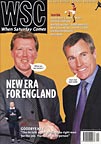 David Stubbs reviews a musical… about football. Oh dear
David Stubbs reviews a musical… about football. Oh dear
Must admit, the prospect of an Andrew Lloyd-Webber-Ben Elton musical set in Troubles-ridden Northern Ireland about a local football team didn’t brace me. This is going to be bad, I thought. Groan-out-loud bad. Tear your programme into sweaty shreds and assume the foetal position bad.
Imagine my surprise, then, when it turned out to be far worse than I had anticipated. Within seconds of the curtain rising my jaw dropped like the patrons of the musical Springtime For Hitler in Mel Brooks’s The Producers and stayed dropped throughout this traumatically awful show.
Mooted over a convivial dinner with Lloyd-Webber, The Beautiful Game is set between 1969 and 1971 and follows the lives, loves and (mis)fortunes of a Belfast youth team whose members are drawn into the hostilities. One joins the IRA, another is killed by Protestants, another kneecapped. The main protagonist, John, the most promising footballer, has his chance of escaping to the mainland and Everton FC thwarted when he is interned.
For the cretinous sub-specimen of popular culture that is the West End musical this is strong stuff. However, only the most psychotic sectarian bonehead could disagree with the sentiments expressed here – love better than hate. The Beautiful Game offers no fresh insights, rather a set of platitudinous cliches about bigotry which clunk you like a low beam at every turn of the script. The characters are cardboard stock – the blokes all eejits, of course, the women all strong as denoted by standing with arms crossed and making like Hylda Baker whenever they spout dialogue.
All of this, mind, set to the music of Lloyd-Webber, so stupefyingly bland it defies invective. A lazy blast of Gaelic whistle apart, it offers no sense of location, period or atmosphere. Song titles like Let Us Love In Peace and All The Love I Have tell you all you need to know. Elton’s amateurishly mawkish lyrics are matched with tinklingly anaemic light orchestral accompaniments, variations on a theme from Blankety Blank. It’s like eating cotton wool.
What, then, of the football angle? Well, as Elton admits, he’s never been a fan and his unenthusiasm rings hollow throughout. The mock-terrace chants are from the Zigger Zagger school of authenticity, with phrases like “Green is the colour/Soccer is the game”, “Nice one United/We’re really delighted” and “We’d be nowhere without me chopping up the other side’s defence” resounding with cluelessness about the argot of the game.
You assume Elton is using football as, well, a football, in order to kick home some point about the Troubles. Even this, however, is unclear. For instance, the team, run by the redoubtably broad-minded Father O’ Donnell, of whom they’re all “scared shitless”, starts out with one Protestant member. However, after a Loyalist atrocity, he is chased out by a team-mate. Father O’ Donnell apparently has no comment on this and neither does the script – the fact that they are now a sectarian XI, and the implications of this, are forgotten.
The actual football scenes have to be seen to be disbelieved. Drama students swivel and scissors-kick in that manner peculiar to musicals that isn’t quite ballet, isn’t quite aerobics but more reminiscent of the sort of gamely inept moves Shakin’ Stevens used to attempt during his unfortunate HiNRG period in the late Eighties. This is not what Pelé had in mind.
As for the audience, they laugh guiltily at the swear-words and phrases like “brewers droop” and “hand shandy” as if they’ve been freshly minted by Elton. That said, this was not a full house, suggesting that The Beautiful Game is a bit much for the normal Lloyd-Webber crowd. Well, it deserves to fail. Football certainly doesn’t deserve this sort of patronisingly incompetent treatment – still less do the Troubles.
From WSC 166 December 2000. What was happening this month